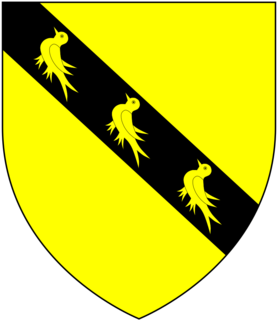Related Research Articles

Hugh Latimer was a Fellow of Clare College, Cambridge, and Bishop of Worcester during the Reformation, and later Church of England chaplain to King Edward VI. In 1555 under the Catholic Queen Mary I he was burned at the stake, becoming one of the three Oxford Martyrs of Anglicanism.

William Allen, also known as Guilielmus Alanus or Gulielmus Alanus, was an English Cardinal of the Roman Catholic Church. He was an ordained priest, but was never a bishop. His main role was setting up colleges to train English missionary priests with the mission of returning secretly to England to keep Roman Catholicism alive there. Allen assisted in the planning of the Spanish Armada's attempted invasion of England in 1588. It failed badly, but if it had succeeded he would probably have been made Archbishop of Canterbury and Lord Chancellor. The Douai-Rheims Bible, a complete translation into English from the Latin, was printed under Allen's orders. His activities were part of the Counter Reformation, but they led to an intense response in England and in Ireland. He advised and recommended Pope Pius V to pronounce Elizabeth I deposed. After the Pope declared her excommunicated and deposed, Elizabeth intensified the persecution of her Roman Catholic religious opponents.

The University of Douai is a former university in Douai, France. With a medieval heritage of scholarly activities in Douai, the university was established in 1559 and lectures started in 1562. It closed from 1795 to 1808. In 1887, it was transferred as University of Lille 27 km away from Douai.
The English College, was a Catholic seminary in Douai, France, associated with the University of Douai. It was established in about 1562, and was suppressed in 1793. It is known for a Bible translation referred to as the Douay–Rheims Bible. Of over 300 priests from Douai sent on the English mission, about one-third were executed. The dissolution of the college at the time of the French Revolution led to the founding of Crook Hall near Lanchester in County Durham, and St Edmund's College, Ware. It is popularly believed that the indemnification funds paid by the French for the seizure of Douai's property were diverted by the British commissioners to complete the furnishings of George IV's Royal Pavilion at Brighton.
Richard Bristow was an English Catholic controversialist and Biblical scholar.
Thomas Worthington, D.D. was an English Catholic priest and third President of Douai College.

Richard Smyth was the first person to hold the office of Regius Professor of Divinity in the University of Oxford and the first Chancellor of the University of Douai.
Gilbert Bourne was the last Roman Catholic Bishop of Bath and Wells, England.

Thomas Stapleton was an English Catholic controversialist.

The Reverend Father Gregory Martin was an English Catholic Priest, a noted scholar of his time, academic and Doctor of Divinity, and served as the chief translator of the Rheims and Douai Version of the Bible, the first full, official Catholic English Bible translation, translated from the Latin Vulgate.
Cæsar Clement was an English Catholic recusant.
Francis Davenport, O.M.R., also known as Father Francis of Saint Clare, was an English Catholic theologian, a Recollect friar and royal chaplain.
George Haydock was an English Roman Catholic priest. He is a Catholic martyr, beatified in 1987. He is not to be confused with his relative, also a priest, George Leo Haydock (1774–1849).
John Martiall (Marshall) was an English Roman Catholic priest. He was one of the six companions associated with William Allen in the foundation of the English College at Douai, in 1568.
Thomas Dorman was an English Catholic theologian.

Thomas Harding was an English Roman Catholic priest and controversialist. He was one of the Worthies of Devon of the biographer John Prince (d.1723).
Gabriel Gifford OSB was an English Roman Catholic Benedictine monk who became Archbishop of Reims.
Augustine Lindsell was an English classical scholar and Bishop of Hereford. In church matters he was advanced by Richard Neile, and was a firm supporter of William Laud. As a scholar he influenced Thomas Farnaby.
William Hyde (1597–1651) was an English Roman Catholic convert and priest, presumed to be of Dutch or Flemish background, who became President of the English College, Douai.
Edward Weston (1566–1635) was an English Roman Catholic priest and controversialist.
References
- ↑ "Bailey, Thomas (BLY543T)". A Cambridge Alumni Database. University of Cambridge.
![]() This article incorporates text from a publication now in the public domain : Herbermann, Charles, ed. (1913). "Thomas Baily". Catholic Encyclopedia . New York: Robert Appleton Company.
This article incorporates text from a publication now in the public domain : Herbermann, Charles, ed. (1913). "Thomas Baily". Catholic Encyclopedia . New York: Robert Appleton Company.
